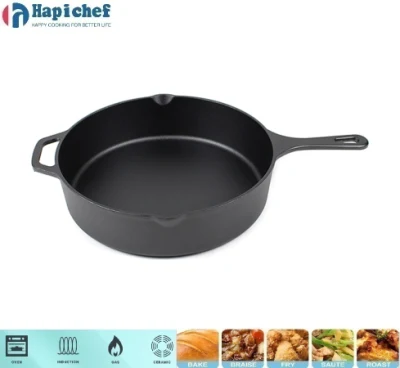cast iron skillet soap
The Importance of Using Soap for Cast Iron Skillets
Cast iron skillets have been a beloved kitchen staple for centuries, prized for their unparalleled heat retention and even cooking capabilities. However, maintaining these cooking wonders requires a bit of care and attention, especially when it comes to cleaning them. One common question among cast iron enthusiasts is whether soap can be used on these skillets. Let's dive deeper into this topic and understand the role of soap in the upkeep of cast iron cookware.
Traditionally, the prevailing belief has been that soap should never touch a cast iron skillet. This notion stems from the understanding that soap can strip away the seasoning—the polymerized oil layer that develops on the surface of the skillet, providing a natural, non-stick cooking surface. However, modern perspectives on this age-old debate are shifting.
Soap, as we know it today, is much milder than the harsh soaps that were once prevalent. Most mainstream dish soaps are designed to be gentle on hands and surfaces, and they do not possess the strong alkaline properties that would damage seasoned cast iron. In fact, using a small amount of soap occasionally can help to strip away buildup from foods and oils that may otherwise accumulate over time.
When it comes to cleaning your cast iron skillet, the key is to avoid excessive amounts of soap. A few drops can do wonders, especially after cooking particularly messy dishes. Here’s how to effectively clean your cast iron skillet with soap while preserving its seasoning
1. Cool Down After cooking, allow your skillet to cool slightly but not completely. It’s best to clean it while it’s still warm, as food residues will come off more easily.
cast iron skillet soap

2. Rinse and Scrape Rinse the skillet with warm water and use a non-metal brush, a sponge, or a scraper to remove any stuck-on food. Avoid using steel wool or abrasive cleaners, as they can scratch the seasoning.
3. Use Soap Sparingly If there is stubborn residue, add a few drops of mild dish soap to your sponge. Gently scrub the area, ensuring that you’re not overdoing it. Rinse thoroughly with warm water.
4. Dry Immediately Water can lead to rust, so it’s vital to dry your skillet immediately. You can place it on a low burner on the stove for a minute or two to ensure all moisture evaporates.
5. Re-Season as Necessary If you notice that the skillet’s seasoning has been affected or looks dull, apply a thin layer of vegetable oil or a dedicated cast iron conditioner while the pan is still warm. Wipe off any excess before storing it.
While using soap isn’t the end of the world for your cast iron skillet, it's important to take care not to make it a regular habit. Routine cleaning with hot water and a scraper should generally be sufficient for most meals, allowing the natural seasoning process to continue effectively.
In conclusion, the debate over whether to use soap on cast iron skillets is nuanced. Moderation is key; using a small amount of mild soap occasionally is acceptable and can help maintain the surface of your pan. As with all aspects of cooking, what works best often comes down to individual preferences and practices. With proper care, your cast iron skillet can last for generations, providing delicious meals and cherished memories in the kitchen. Embrace the care it requires, and your cookware will reward you with countless culinary successes. Happy cooking!
-
Why Every Kitchen Needs a Casserole Cast Iron DishNewsJun.24,2025
-
Experience the Tradition and Quality of Cast Iron CookwareNewsJun.24,2025
-
Double Sided Cast Iron Grill PanNewsJun.24,2025
-
Cast Iron Dutch Ovens You’ll Actually UseNewsJun.24,2025
-
Buy Cast Iron Griddle for Everyday CookingNewsJun.24,2025
-
Barbecue Iron Grill Cooking PowerNewsJun.24,2025
-
Standard Product Lines from Cast Iron Cookware SuppliersNewsJun.11,2025
